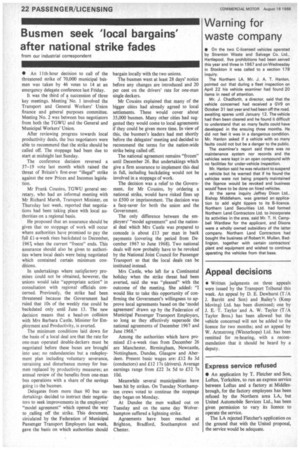Busmen seek 'local bargains' after national strike fades
Page 24

If you've noticed an error in this article please click here to report it so we can fix it.
from our industrial correspondent • An I 1 th-hour decision to call of the threatened strike of 70,000 municipal Nismen was taken by 46 votes to 14 at an emergency delegate conference last Friday.
It was the third of a succession of three key meetings. Meeting. No. I involved the Transport and General Workers' Union finance and general purposes committee. Meeting No. 2 was between bus negotiators from both the TGWU and the General and Municipal Workers' Union.
After reviewing progress towards local productivity deals, the bus negotiators were able to recommend that the strike should be called off. The stoppage had been due to start at midnight last Sunday.
The conference decision reversed a 37-19 vote last month which raised the threat of Britain's first-ever "illegal" strike against the new Prices and Incomes legislation.
Mr Frank Cousins, TGWU general secretary, who had an informal meeting with Mr Richard Marsh, Transport Minister, on Thursday last week, reported that negotiations had been taking place with local authorities on a regional basis.
He proposed that an assurance should be given that • no stoppage of work will occur where authorities have promised to pay the full £1-a-week rises backdated to December, 1967! when the current "freeze" ends. This assurance should also be given to authorities where local deals were being negotiated which contained certain minimum conditions.
In undertakings where satisfactory promises Could not be obtained, however, the unions would take "appropriate action" in consultation with regional officials concerned. Previously, the strike had been threatened because the Government had ruled that lOs of the weekly rise could be backdated only until June 13. The new decision means that a head-on collision with Mrs Barbara Castle. Minister for Em,ployment and Productivity, is averted.
The minimum conditions laid down for the basis of a local deal are that the rate for one-man operated double-deckers must be negotiated before these buses are brought into use; no redundancies but a redeployment plan including voluntary severance, retraining and disturbance money for busmen replaced by productivity measures; an annual review of the benefits from one-man bus operations with a share of the savings going to the busmen.
Delegates from more than 90 bus undertakings decided to instruct their negotiators to seek improvements in the employers' "model agreement" which opened the way to calling off the strike. This document, circulated by the Federation of Municipal Passenger Transport Employers last week, gave the basis on which authorities should bargain locally with the two unions.
The busmen want at least 28 days' notice before any changes are introduced and 20 per cent on the drivers' rate for one-man single deckers.
Mr Cousins explained that many of the bigger cities had already agreed to local settlements. These would cover about 35,000 busmen. Many other cities had suggested they would come to local agreements if they could be given more time. In view of this, the busmen's leaders had met shortly before the delegates' meeting and decided to recommend the terms for the nation-wide strike being called off, The national agreement remains "frozen" until December 26. But undertakings which give a firm assurance to implement this deal in full, including backdating would not be involved in a stoppage of work.
The decision was a relief to the Government, for Mr Cousins, by oidering a national strike, would have risked fines up to £500 or imprisonment. The decision was a face-saver for both the union and the Government.
The only difference between the employers' "model agreement" and the national deal which Mrs Castle was prepared to concede is about £13 per man in back payments (covering the period from December 1967 to June 1968). Two national deals will now probably have to be revoked by the National Joint Council for Passenger Transport so that the local deals can be instituted instead.
Mrs Castle, who left for a Continental holiday when the strike threat had been averted, said she was "pleasedwith the outcome of the meeting. She added: "I would like to take this opportunity of confirming the Government's willingness to approve local agreements based on the 'model agreement' drawn up by the Federation of Municipal Passenger Transport Employers, so long as they effectively supersede the national agreements of December 1967 and June 1968."
Among the authorities which have promised £1-a-week rises from December 26 are Manchester, Birmingham, Newcastle, Nottingham, Dundee, Glasgow and Aberdeen. Present basic wages are: £12 8s 3d (conductors) and £12 17s (drivers). Average earnings range from £22 3s 5d to £32 7s 10d.
Meanwhile several municipalities have been hit by strikes. On Tuesday Northampton crews voted to continue the stoppage they began on Monday.
At Dundee the men walked out on Tuesday and on the same day Wolverhampton suffered a lightning strike.
Agreements have been reached at Brighton, Bradford, Southampton and Chester.




































































































